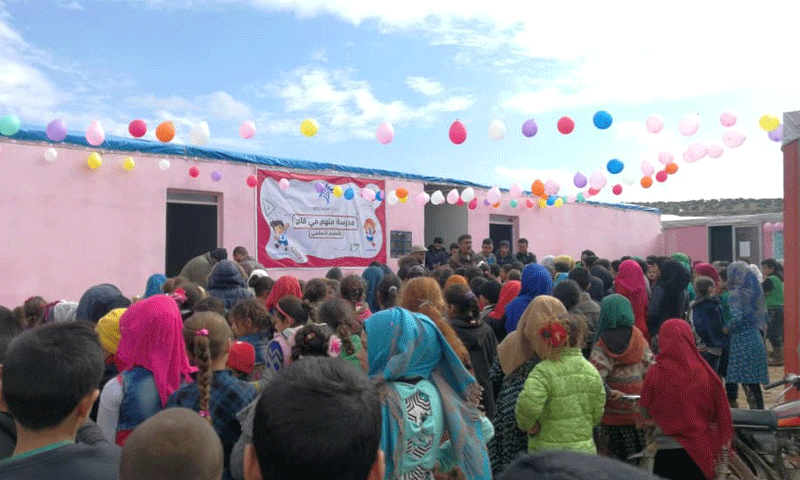Numerous children of primary education age are forced to drop out of schools and educational centers, given poor living conditions of the IDP camps within Syria, which are not provided with schools and educational services. Among these camps are Qah IDP camp, which hosts displaced people from the provinces of Homs and Hama.
The Molham Volunteering Team (MVT) officially opened a school on 29 February under its supervision in Qah IDP camp, north of Idlib, while students started attending classes at the school in October 2019, under incomplete educational circumstances, in the forms of services and material requirements.
A few months ago, the school was just three classroom tents, which are prefabricated “caravans.”
Later, classrooms were constructed to provide students with a suitable learning environment. Last February, the school was also equipped with a department of administrative affairs and services, and washrooms, which is an essential part of any integrated educational process, according to the program assistant in the MVT, Noman Badran.
Badran added to Enab Baladi that the need was so high because the region lacks educational centers for the various educational levels, as no party has ensured the provision of an educational service there. Moreover, people who have been displaced from the rural areas in the provinces of Idlib and Hama recently have the intention to settle in the Qah region, in the camp of Kafr Nabudah.
Nearly 400 families take shelter in the camp, and thus, the school initially received 235 students from the camp. After one month of the school start, the number of students amounted to 250 while at present, there are 246 students attending classes regularly at the beginning of the second semester.
The school provides primary education for male and female students from grades one to six, intending to save them from ignorance and illiteracy under the most tragic situation, according to the description of the educational project through the MVT site.
As for the curricula taught in the school, the educational project organizers adopted the curricula which are licensed and approved by the Idlib education directorate.
Badran emphasized that the teaching cadres in the educational project are following new teaching methods for imparting a great deal of knowledge and information to the students, without relying on indoctrination. Teachers use demonstration methods and practical activities, which increase according to students’ intellectual development and awareness. Besides, teachers are working on developing the learning skills of students who lived a period of fear because of bombardment and forcible displacement.
Students have to pass an assessment test in order to determine their level of understanding and comprehension as well as their weaknesses. Then, they are placed in the appropriate educational class, with a focus on compensating for their shortcomings, through educational activities evaluated by the school administration.
When the MVT school started operating, residents of many other camps in Idlib resorted to setting up open-air schools; these schools do not have pillars or walls to combat lack of financial support and poverty, which are adhered to their tents.
“The Idlib education directorate” does not have an accurate statistics on the number of schools that have proliferated in the informal camps and population centers in Idlib, due to the lack of financial support that education has faced since the beginning of the school year. However, the education directorate in Idlib estimated there are more than 60 schools.
The Idlib education directorate managed to supervise 1,194 schools throughout Idlib before the Syrian regime and its ally Russia initiated their military campaign in the northern countryside of Hama and the southern countryside of Idlib in February 2019. However, after the Syrian regime forces with the support of the Russian air force targeted systemically schools, re-took control of some areas, and displaced about one million persons to northern Syria, 350 schools went out of service.











